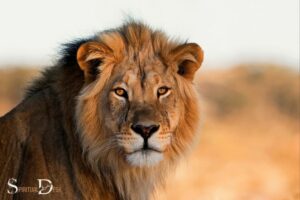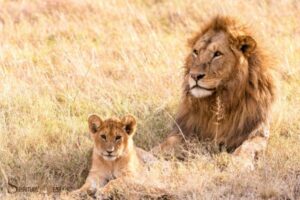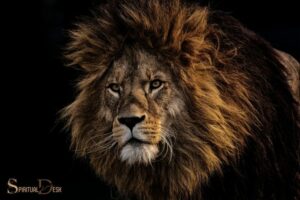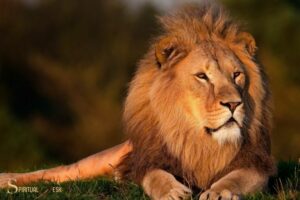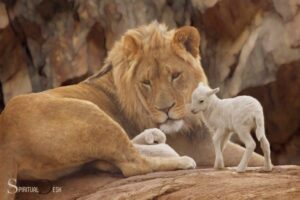Lion Dance Spiritual Meaning: Strength And Courage!
Lion dance is a traditional Chinese dance in which performers mimic a lion�s movements in a lion costume.
This dance is meant to bring good luck and prosperity, and to drive away evil spirits. The movements of the lion dancers also symbolize luck, strength, and courage.
The Lion Dance embodies the spiritual philosophy of Chinese culture where the lion, a powerful and noble creature, is seen as a symbol of bravery and strength.
The dance is performed with energetic movements that mimic a lion’s behavior to drive away negative energy or “evil spirits”, and invite prosperity and good luck.
The Lion Dance is also a manifestation of the Yin and Yang principle as it brings balance and harmony.
The lion dance is believed to be a powerful symbol of luck and protection in Chinese culture.
The performance of the lion dance with its acrobatic and vibrant movements is believed to bring in good luck and fortune, and to ward off evil spirits. It is also a representation of the Chinese people�s strength and courage.
8 Aspects: Lion Dance Spiritual Meaning
| Aspect | Spiritual Meaning |
|---|---|
| Color | The colors of the lion costume have specific meanings. Red symbolizes good luck and happiness, while gold/yellow represents wealth and prosperity. Green represents friendship and harmony, and black conveys power and ferocity. |
| Lion’s Head | The lion’s head represents wisdom, while its large eyes symbolize alertness and its horn signifies power. The lion’s mouth is open to scare away evil spirits and to bring good fortune. |
| Lion’s Beard | The beard of the lion symbolizes longevity, signifying the ancient Chinese belief in living a long life through virtuous acts. |
| Lion Dance Movements | The movements of the lion dance are designed to mimic the natural movements of a lion, symbolizing strength and power. The dance is also a display of courage and teamwork, as the performers must work together to produce a coordinated and graceful performance. |
| Mirror on Lion’s Forehead | The mirror on the lion’s forehead is believed to have the power to deflect evil spirits and negative energy. It is thought to protect the performers and the community from harm. |
| Drumming | The drumming during the lion dance provides the rhythm and energy that drives the performance. The drum beats symbolize the lion’s heartbeat and are believed to have the power to ward off evil spirits. |
| Cai Qing (Plucking the Greens) | The lion “plucks the greens” (usually a head of lettuce), which represents wealth and prosperity. The lion then “eats” the greens and “spits” them out, symbolizing the spreading of good luck and blessings to the audience. |
| Firecrackers | Firecrackers are often used during the lion dance performance to create a loud, festive atmosphere. The loud noise is believed to scare away evil spirits and bring good luck to the community. |
Key Takeaway
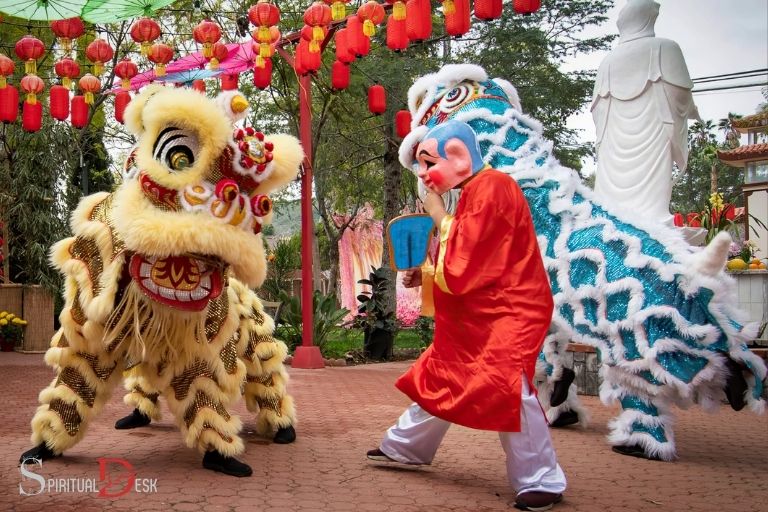
Five Facts About: Spiritual Meaning of the Lion Dance
Understanding The Cultural Significance
Lion Dance Spiritual Meaning
The lion dance holds a deep spiritual meaning in chinese culture. It is a vibrant and dynamic art form that not only entertains but also carries significant cultural significance.
Lion Dance In Chinese Culture
- The lion dance has been an integral part of chinese culture for centuries, symbolizing luck, prosperity, and warding off evil spirits.
- It is often performed during festive occasions such as chinese new year, weddings, business openings, and other celebrations.
- The lion dance is believed to bring good fortune and blessings to the community and individuals involved.
A Historical Dive Into The Origins
- The origins of the lion dance date back thousands of years to ancient china.
- It is believed to have originated during the han dynasty and was initially performed to scare away evil spirits and bring good luck to the community.
- The dance was inspired by folklore and mythology, where the lion was considered a sacred and powerful creature.
- Over time, the lion dance evolved into a highly skilled performance art, combining martial arts, acrobatics, and dance.
- The dance is typically performed by a pair of dancers who mimic the movements and characteristics of a lion.
- The intricate lion costumes, often brightly colored and adorned with elaborate designs, add to the visual spectacle of the dance.
- The lion dance is accompanied by the rhythmic beats of drums, cymbals, and gongs, creating an energetic atmosphere.
Each movement in the lion dance has its own symbolic meaning.
Here are some key points to understand:
- The lion�s eye-opening ceremony signifies the awakening of the lion and the start of the performance. It represents the lion coming to life and bringing blessings to the community.
- The lion�s various actions and gestures, such as bowing, stretching, and shaking its tail, symbolize different auspicious meanings such as good luck, prosperity, and harmony.
- The dance often includes interactions with an accompanying character, known as the �laughing buddha� or �god of wealth,� who spreads joy, happiness, and prosperity to the spectators.
- The climax of the lion dance involves the �plucking of the greens,� where the lion grabs and eats lettuce, and spits out the leaves. This act signifies prosperity, as the lettuce is a homophone for wealth in chinese.
The lion dance holds a deep spiritual meaning in chinese culture, rooted in ancient traditions and beliefs. It represents more than just a performance; it is a reflection of the values, aspirations, and hopes of the chinese people.
Through its vibrant movements and symbolism, the lion dance continues to captivate audiences and celebrate the rich cultural heritage of china.
Symbolism And Rituals Of The Lion Dance
Lion Dance Spiritual Meaning
In traditional chinese culture, the lion dance holds deep spiritual significance. This captivating and vibrant performance is more than just a form of entertainment; it embodies centuries-old traditions, symbolism, and rituals.
Understanding the spiritual essence of the lion dance allows us to embrace its power and appreciate its significance in chinese culture.
The Spiritual Essence Of Lion Dance
The lion dance reflects various aspects of spirituality, including the belief in mythical creatures, the power of symbolism, and the importance of rituals.
Let�s explore the spiritual essence of the lion dance:
- Bridging the human and divine: The lion, with its mythical associations, serves as a bridge between the human and divine worlds. It is believed to possess spiritual powers and protective qualities, making it an important figure in religious and ceremonial events.
- Honoring ancestors and deities: The lion dance is often performed during festive occasions, temple celebrations, or ancestral ceremonies, serving as a way to pay homage to ancestors and deities. It is seen as a sacred act of connection with the spiritual realm.
- Warding off negative energy: The lion dance is believed to drive away negative energy and evil spirits. As the lion prances and leaps, its movements are thought to cleanse the surroundings and bring good fortune and prosperity.
Embracing The Power Of Yin And Yang
The lion dance is intimately connected to the concept of yin and yang, the harmonious balance of opposing forces.
Here�s how this duality manifests in the lion dance:
- Yin and yang lions: The lion dance typically involves two lions: one representing the yin (female) energy and the other symbolizing the yang (male) energy. Together, they embody the balance and complementarity of these opposing forces.
- Dynamic choreography: Through its dynamic movements, the lion dance symbolizes the continuous interplay between yin and yang. The lion�s graceful yet powerful actions embody the harmony and synergy between these forces.
- Attracting positive energy: The rhythmic drumming and bold lion movements are believed to attract positive energy, signifying the triumph of light over darkness, positive over negative, and balance over chaos.
The lion dance is much more than a visually captivating performance. It carries deep spiritual meaning, rooted in ancient traditions.
By understanding its symbolism and rituals, we can appreciate the significance of the lion dance in chinese culture, embracing its spiritual essence and the power of yin and yang.
Exploring The Five Elements
Lion Dance Spiritual Meaning
The lion dance, an ancient chinese tradition, holds deep spiritual significance. The colorful and energetic performance is not just a form of entertainment but also a way to connect with the divine.
Through intricate movements and vibrant costumes, the lion dance represents the harmony between man and nature.
Fire: Igniting Passion And Energy
- The element of fire symbolizes passion, energy, and transformation.
- The lion dance, with its dynamic movements and fiery leaps, embodies the essence of fire.
- It ignites passion and energy within both the performers and the audience.
- Fire is believed to bring good luck and ward off evil spirits, making the lion dance a powerful ritual during festive celebrations.
Water: Cleansing And Renewal
- Water represents cleansing, renewal, and the flow of life.
- The lion dance incorporates fluid movements, mimicking the graceful nature of water.
- It is believed that the dance can cleanse negative energy and bring forth positive vibes.
- The rhythmic sound of drums and cymbals accompanying the dance symbolizes the flow of water, adding to its spiritual significance.
Wood: Growth And Harmony
- Wood symbolizes growth, harmony, and vitality.
- The lion dance embodies the essence of wood through its lively and rhythmic movements.
- It signifies the growth and abundance of nature, bringing prosperity and good fortune.
- The dance promotes harmony by connecting individuals with the natural world, fostering a sense of unity and balance.
Metal: Strengthening The Mind And Body
- Metal represents strength, endurance, and clarity of mind.
- The lion dance requires physical strength, agility, and mental focus from the performers.
- The synchronized movements of the lion dance promote discipline and mental fortitude.
- By participating in the dance, individuals can strengthen their mind and body, cultivating resilience and determination.
Earth: Nurturing Stability And Balance
- Earth symbolizes stability, grounding, and balance.
- The lion dance, with its firm and grounded movements, represents the stability of the earth.
- It reminds us of the importance of finding balance in our lives.
- The dance fosters a sense of connection to the earth, grounding individuals and providing a sense of stability and security.
The lion dance�s spiritual meaning is deeply tied to the five elements. Through the elements of fire, water, wood, metal, and earth, the lion dance connects individuals to the divine and promotes harmony, growth, strength, and balance.
By understanding the symbolism behind the dance, we can truly appreciate the spiritual significance it holds.
So next time you witness the lion dance, delve deeper into its meaning and allow yourself to be captivated by the wisdom it imparts.
Lion Dance And Spiritual Connection
The lion dance is a captivating form of traditional chinese performance art that goes beyond mere entertainment. Rooted in ancient customs and beliefs, the lion dance holds a deep spiritual meaning that is often overlooked.
Let�s explore how this vibrant dance form facilitates the channeling of positive energy through movement and the meditative influence it can have on both performers and spectators.
Channeling Positive Energy Through Movement
- The lion dance is a dynamic display of movement that engages the body, mind, and spirit.
- The rhythmic and coordinated steps of the dancers help in channeling positive energy, creating a harmonious flow.
- Through meticulous control of their bodies, performers aim to embody the grace and power of the lion, symbolizing courage, strength, and good luck.
- The dance movements are carefully choreographed with specific intentions, such as casting away evil spirits, promoting abundance, and inviting blessings.
- The high energy levels and vibrant colors of the lion dance help in uplifting the atmosphere, bringing about joy and positivity.
The Meditative Influence Of Lion Dance
- As performers immerse themselves in the lion dance, they enter a focused state of mind, akin to meditation.
- The repetitive nature of the dance steps allows individuals to enter a trance-like state, shutting out distractions and finding inner peace.
- By focusing on their breath and body movements, performers can cultivate mindfulness and connect deeply with their inner selves.
- Through this meditative influence, dancers can experience a sense of oneness with the lion spirit, tapping into its wisdom and strength.
- Spectators, too, can experience a meditative state while witnessing the lion dance, as they become entranced by the rhythmic beats and hypnotic movements.
The lion dance goes beyond being a mere performance; it is an embodiment of spirituality and cultural symbolism.
By channeling positive energy and inducing a meditative state, this age-old tradition provides both performers and spectators with a unique spiritual experience.
So, the next time you witness a lion dance, allow yourself to be drawn into its sacred essence and embrace the spiritual connection it offers.
Benefits Beyond The Physical
Lion Dance Spiritual Meaning: Benefits Beyond The Physical
Lion dance is a captivating traditional chinese performance that goes beyond its physical beauty and skill.
This rich cultural practice holds deep spiritual significance and brings several benefits to the community and individuals alike.
Strengthening Community Bonds
- Uniting people: The lion dance serves as a powerful symbol of unity, bringing together people from different backgrounds and fostering a sense of togetherness within the community.
- Celebrating festivities: The performance often accompanies festive occasions such as chinese new year, cultural events, and community celebrations. It reinforces collective joy and reinforces community cohesion.
- Promoting cultural heritage: By showcasing this traditional art form to the wider community, lion dancing helps preserve and promote cultural heritage, instilling a sense of pride and connection among community members.
- Building relationships: Lion dance teams comprise dedicated individuals who work closely together. Through collaborative practice sessions and performances, team members develop close bonds and relationships, which extend beyond the lion dance community.
Inspiring Confidence And Courage
- Overcoming fear: The intricate lion dance movements require performers to conquer their fears and push their physical boundaries. By doing so, they develop self-confidence and the ability to face challenges head-on.
- Personal growth: The practice of lion dancing encourages personal growth on both a physical and mental level. Performers gain strength, agility, and coordination, as well as develop mental resilience and discipline.
- Boosting self-esteem: Accomplishment through mastering complex lion dance techniques and captivating an audience not only boosts self-esteem but also empowers individuals to take on other life challenges.
- Channeling positive energy: Lion dance is believed to drive away negative energy and bring good fortune. Participating in the dance allows individuals to tap into this positive energy, fostering a sense of optimism and inspiration.
Embracing The Spiritual Essence
- Connecting with ancestors: Lion dance has roots in ancient chinese folklore and is believed to bring blessings from ancestors. This connection with the past adds a spiritual dimension to the performance, allowing participants to honor their ancestors and embrace their heritage.
- Symbolizing strength and protection: The lion is often associated with strength and protection, serving as a guardian symbol. The lion dance allows individuals to embody these qualities and tap into their own inner strength and resilience.
- Invoking good fortune: The lion dance is traditionally performed in front of businesses, homes, and temples to bring prosperity and blessing. This act of invoking good fortune reinforces a positive mindset and attracts success to individuals and the community.
Lion dance extends beyond its physical prowess as a performance art. Its spiritual meaning brings the community together, inspires confidence, and offers individuals an opportunity to embrace their cultural heritage while experiencing personal growth.
By participating in lion dance, individuals can tap into the positive energy, channel their courage, and connect with the spiritual essence of this ancient tradition.
FAQ About Lion Dance Spiritual Meaning
Conclusion
The spiritual meaning behind the lion dance is a fascinating and profound aspect of chinese culture. Through its captivating movements and symbolic gestures, the lion dance embodies the principles of courage, strength, and prosperity.
The lion is not simply a performer, but a vessel for spiritual energy, inviting good fortune and warding off evil spirits.
It is believed that the dance can bring blessings and celestial blessings to those who witness it. The rhythmic beating of drums and cymbals, combined with the energy and skill of the dancers, creates an incredible spectacle that connects the physical world with the spiritual realm.
The lion dance is not just a form of entertainment, but a powerful ceremonial tradition that carries deep significance.
It serves as a reminder of the importance of preserving ancient customs and cultural heritage, while also reminding us of the timeless universal values that unite us all.
Witnessing the lion dance can truly be a transformative experience, immersing us in the rich tapestry of tradition and spirituality.
Bonus: Lion Dance Spiritual Meaning
What Does a Lion Dance Symbolize?
A lion dance is a traditional Chinese performance in which dancers don a lion costume and mimic the movements of a lion. The dance is often performed during the Chinese New Year and other festive occasions.
The lion dance is said to bring good luck and fortune, and it is believed to ward off evil spirits. The dance is also thought to promote harmony between people and nature.
spiritualdesk.com
Is the Lion Dance Religious?
The lion dance is a traditional Chinese dance that is often performed during the Lunar New Year and other Chinese festivals. The dance is said to bring good luck and fortune and is believed to have originated from Buddhist and Taoist traditions.
While the lion dance is often associated with religious ceremonies, it is not necessarily a religious act in itself. Rather, the lion dance is more of a cultural tradition that has been passed down through generations.
Nevertheless, the lion dance does have some religious significance for those who perform it. For Buddhists, the lion symbolizes strength, power, and courage � qualities that are needed to overcome obstacles in life.
The lion also represents wisdom and compassion, two key tenets of Buddhism. For Taoists, meanwhile, the lion embodies the idea of yin and yang � two forces that must be in balance in order for harmony to be achieved.
So while the lion dance may not be a strictly religious activity, it certainly has deep meaning for those who perform it.
What Do Lion And Dragon Dances Symbolize?
Lion and dragon dances are a traditional part of Chinese New Year celebrations. The lion dance is said to bring good luck and fortune, while the dragon dance is believed to ward off evil spirits.
Both lion and dragon dances are performed by teams of dancers, who must be skilled in martial arts and acrobatics. The dancers wear brightly-colored costumes and often have elaborate headdresses.
The lion dance is usually performed first, followed by the dragon dance. During the lion dance, the dancers mimic the movements of a lion, including stalking, pouncing, and roaring.
The dragon dance is much more fluid, with the dancers weaving in and out of each other to create an undulating snake-like creature.
Lion and dragon dances are always popular with spectators, who often throw money or other small items onto the stage as a sign of good luck.
Lion Dance Meaning
A lion dance is a traditional Chinese dance in which performers mimic a lion’s movements in order to bring good luck and fortune.
The lion is considered to be a symbol of power and strength, and the dance is often performed during special occasions such as the Chinese New Year.
The origins of the lion dance can be traced back to the Han Dynasty when it was used as a form of entertainment for the imperial court.
Over time, the dance began to evolve and take on a different meaning for different cultures. In some cases, it became a way to ward off evil spirits or bring good luck.
Today, the lion dance is still popular in many parts of Asia and has even spread to other parts of the world. It is often used as a form of celebration or decoration during festivals and events.
Lion Dance Origin
The lion dance is a traditional Chinese dance in which performers mimic a lion’s movements in order to bring good luck and fortune. The Lion Dance is usually performed during the Chinese New Year and other important celebrations.
The origins of the lion dance can be traced back to the Han Dynasty when it was used as a form of entertainment for the imperial court.
spiritualdesk
Over time, the dance became more popular with the general public and began to be used as a way to ward off evil spirits and bring good luck.
Today, lion dances are often performed at weddings, business openings, and other special occasions. The lions are believed to bring good luck and fortune to those who witness them, making them a popular choice for events that are meant to be auspicious.
Lion Dance Colors Meaning
The lion dance is an important part of Chinese culture and tradition. The colors of the lion dance costume have special meaning and are believed to bring good luck.
Here is a guide to the colors of the lion dance and their meanings:

